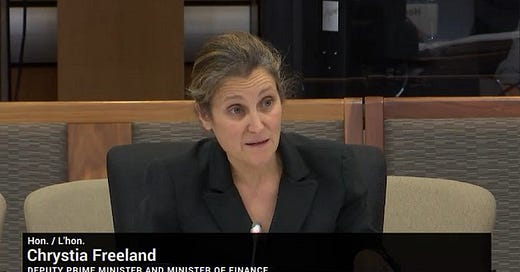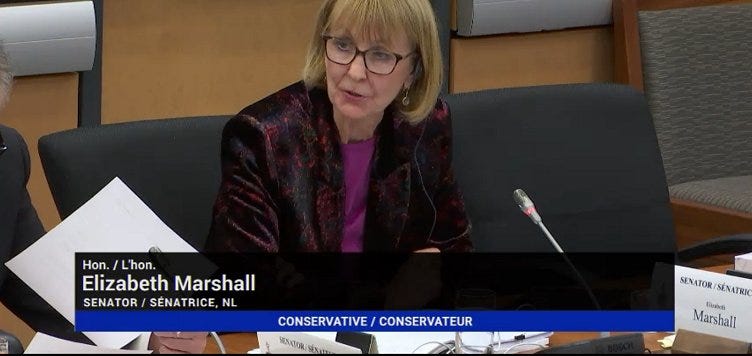Senator grills Freeland over $2 billion Blank Cheque
by Dan Fournier, published Wednesday, Dec. 28, 13:50 EST on fournier.substack.com
Screenshot of Minister of Finance Chrystia Freeland testifying at a Senate Committee on National Finance meeting ‘The subject matter of Bill C-32, Fall Economic Statement Implementation Act, 2022’ on December 7, 2022.
During a Senate Standing Committee on National Finance meeting held on December 7, 2022, Finance Minister Chrystia Freeland faced some challenging questions.
For context, the questioning was with regards to Bill C-32 in which provisions would be made available for the creation of the Canada Growth Fund which was announced in the 2022 Federal Budget.
In its commitment to build a net-zero economy by 2050, the highly ambitious endeavor is seeking between $125 billion and $140 billion of investment every year over that period.
Conservative Senator Elizabeth Marshall asked Freeland the following set of questions [emphasis added] about a corporation that is to be created to help manage the Canada Growth Fund:
“I have some concerns about that section of the bill, it’s going to provide two billion dollars to you as minister to buy shares in a corporation which does not exist. There’s no legislation which tells about this yet to be created corporation. We don’t know anything about the composition of the board or even whether there will be a board. There’s nothing to tell us about the financial controls that’ll be exercised over the two billion dollars and there’s nothing to indicate what the governance structure is going to be. And equally concerning, there’s a section there in that part of the bill that says that the two billion dollars isn’t the most that’s going to be paid out; it leaves it quite open that there could be future monies coming out of the Consolidated Revenue fund and there’s no limit on it. So, what I don’t understand is why if you’re going to establish a fund with money of that magnitude, why isn’t there a separate bill which would outline the specifics of the company, what the company is going to do, what the mandate is, what the objectives are, what the board composition is going to be."
Freeland replies [emphasis added]:
“…what I actually believe is one of the most important elements of…our green transition. The Canada Growth Fund will actually be capitalized at 15 billion dollars and the objective is for that government money to pull in private capital at a ratio of at least three to one. It will be managed by professionals. We understand that we need to have actual investment professionals do this work. It’s going to do some very perform some very sophisticated jobs in the green transition including contracts for difference which we are hearing from investors in Canada and outside Canada is a really important element to ensure that people have the confidence in our carbon pricing system to invest in it…To the question of why are we doing it now I would say to you two things: one, the green transition we have to act quickly, but from my perspective the Biden administration’s Inflation Reduction Act added to the urgency with which Canada needs to act. They are deploying hundreds of billions of dollars to invest in the green transition; we need to move really really fast and so getting this fund in place quickly is more important than ever.”
Rather than answer the senator’s questions, Freeland ops instead, in similar fashion to her November 28 speech, to stress that this “private capital” will be obtained and even “tripled”, but fails to explain how.
She merely mentions that it is important and urgent and to help “ensure that people will have confidence in our carbon pricing system.”
No information was forthcoming about what this ‘carbon pricing system’ would entail or why it needs “confidence.”
Senator Marshall was dumbfounded at Freeland’s response and pushed back, reiterating that giving two billion on a whim with next to no explanation is essentially unjustifiable.
Screenshot of Senator Elizabeth Marshall at a Senate Committee on National Finance meeting ‘The subject matter of Bill C-32, Fall Economic Statement Implementation Act, 2022’ on December 7, 2022.
After praising Senator Marshall as being one of the most “precise questioners” she’s faced, Freeland then states:
“What I would say in terms of the Canada Growth Fund, is what I hear from Canadians and from Canadian businesses, especially in wake of the Inflation Reduction Act, is Canada has to move fast and Canada has to move faster than we have hitherto. So, we are moving quickly to structure the Canada Growth Fund. We’re going to be fully transparent in how we stand it up. And details are going to be forthcoming in the coming weeks and months.”
Frustratingly, Marshall expounds that she is very disappointed in the Bill.
In an earlier December 7 session, Anne David, Director, Corporate Finance and Asset Management for Finance Canada, was also asked about the $2 billion and the Canada Growth Fund (CGF) and did provide some details.
When asked how CGF will be incorporated, she stated that the intent is to introduce an act to Parliament in 2023 in order to have a “permanent structure” in place.
She also said that this act would outline CGF’s structure, board composition, controls, and reporting to Parliament.
And when pressed on whether the fund would have any limits imposed, she replied that there would be no limit.
If Bill C-32 would pass – which it did roughly a week later – the current limit would be fixed at $2 billion. Any amount above that would need another bill such as an appropriation act.
Mrs. David then stated that the CGF would be a wholly-owned subsidiary of CIDA, or the Canadian International Development Agency which is under the purview of Global Affairs Canada. She adds that CIDA “reports to Parliament and Canadians for the Minister of Finance” and that it tables its Annual Report in Parliament and its Quarterly Financial Reports will be posted on its website.
The extent to which the Canada Growth Fund receives additional billions for its anticipated expenditures remains to be seen, for parliamentary approval will be required.
Transparency regarding its structure, board composition, and investments also remain to be seen.
There is no doubt that the federal government is aggressively pushing the green agenda through carbon taxes, CGF, and via other climate-related commitments.
In addition, pressure from certain groups such as Nature Canada calls for massive increases in budget expenditures to “accelerate climate action” with the likes of establishing an Office of Environmental Justice at a cost of no less than $130 million.
Where all the money will come from remains unclear.
The new year will hopefully offer clarity on how such billions will be collected and put to use for the implementation of this green agenda.
Disclaimer:
See the author’s About page for full disclaimer.







Thanks for the links
You may want to check out Parker Gallants website
ESG is Fully Endorsed by Public Sector Pension Plans
https://parkergallantenergyperspectivesblog.wordpress.com/2022/01/21/esg-is-fully-endorsed-by-public-sector-pension-plans/
Ontario Teacher Pension Plan Using our Tax Dollars to Create “Green” Jobs in Other Countries
https://parkergallantenergyperspectivesblog.wordpress.com/2022/05/17/ontario-teacher-pension-plan-using-our-tax-dollars-to-create-green-jobs-in-other-countries/
What happened to the Canada Infrastructure Bank Slush Fund for Liberal cronies these criminals created with the help of their handlers : Blackrock + McKinsey + tax funded Pension Ponzis for civil servants + Bay street banks ?
https://archive.org/details/5687929-Blackrock-Influence-In-CIB-August-27-2018/page/n1/mode/2up
The revolving door between McKinsey + Government
Ottawa names Ehren Cory as next Canada Infrastructure Bank CEO
Mr. Cory spent eight years at Infrastructure Ontario, with the last four as CEO. He has also worked as a partner at McKinsey & Co. in Toronto.
https://archive.ph/Ukjcv#selection-1193.0-1193.62
How lucky for Freeland to have Pension expert Sabia to 'advise' her on the Bank & Finance
https://www.wsj.com/articles/why-caisses-michael-sabia-isnt-your-typical-pension-fund-chief-1507287601
Sabia appointed Chair of the Board of Canada Infrastructure Bank in April 2020 ... working with his Pension Ponzi Pals Sabia + Leech (who since his retirement from OTPP in 2014 ... is now a McKinsey Partner)
https://www.infrastructure.gc.ca/CIB-BIC/bio-michael-sabia-eng.html
Sabia appointed the Deputy Minister of the Department of Finance Canada as of December 14, 2020.
https://www.canada.ca/en/department-finance/corporate/organizational-structure/bios/deputy-minister.html
Sabia whose Feminist mother just happened to be good friends with Freelands Activist mother known as the "Little Communist" in her home town